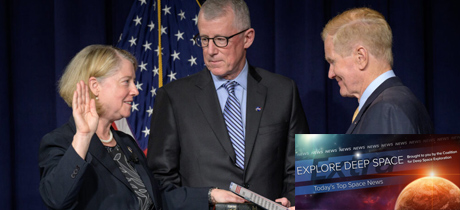In Today’s Deep Space Extra… Pam Melroy was sworn in Monday as NASA’s Deputy Administrator. The InSight Mars lander might end its mission in a year.
Human Space Exploration
Melroy officially onboard at NASA
SpacePolicyOnline.com (6/22): Pam Melroy, retired NASA astronaut and U.S. Air Force test pilot, was sworn in as NASA’s 15th Deputy Administrator on Monday. The ceremony followed the June 17 confirmation by the U.S. Senate of her nomination by President Biden. One other NASA nominee, Margaret Vo Schaus, is still waiting for Senate confirmation to be the agency’s Chief Financial Officer (CFO).
Space Science
Dropping power levels threaten InSight mission
SpaceNews.com (6/22): Dust buildup on the InSight Mars lander’s solar panels is responsible for a decrease in the spacecraft’s power. As a result of the power waning, InSight’s mission could end within a year. The lander’s main instrument, its seismometer, has remained in operation, but shutting it down is not out of the question as Mars approaches aphelion, or the point in the orbit of the planet at which it is farthest from the sun.
The Hubble Telescope’s payload computer is down. NASA has spent days trying to fix it
USA Today (6/21): NASA experts are continuing to resolve a payload computer issue aboard the Hubble Space Telescope, which has disrupted science operations. The problem surfaced on June 13, and a degrading computer memory module aboard the now 31-year-old space observatory could be to blame. Tests to isolate the cause of the issue are continuing.
Record breaker: Scientists spot earliest known supermassive black hole ‘storm’
Space.com (6/21): A Japanese-led research effort has found that the simultaneous evolution of super massive black holes and galaxies was underway as far back as 13 billion years ago. The study, based on observations with ground-based observatories in Hawaii and Chile, was published online in the Astrophysical Journal.
Opinion
A shifting balance of space cooperation?
The Space Review (6/21): Russia and the United States have worked along with Europe, Japan, and Canada, to build and operate the ISS for years. “Now that partnership is changing– or, at least, the Russians want people to think it’s changing,” writes Jeff Foust, the Space Review editor, of past U.S. and Russian cooperation. Recent declarations from Russian leadership about the future of Russia’s cooperation with the U.S., including ambiguous statements about dropping collaboration on the International Space Station (ISS), might signal the partnership could change. “But rhetoric and reality are not always in agreement,” says Foust.
Other News
The Ariane 6 debut is slipping again as Europe hopes for a late 2022 launch
Ars Technica (6/21): European Space Agency (ESA) director general Josef Aschbacher termed the inaugural launch of the Ariane 6, successor to the Ariane 5, before the end of 2022 a very high priority. The heavy lift rocket is intended to have a lower launch cost than its predecessor. “Ariane 6 is our most important launcher to come. We have to put all the energy and all the emphasis into making the maiden flight as soon as possible,” Aschbacher said in remarks at the Paris Air Forum on Monday.

